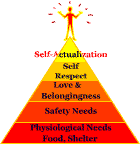Humanistic Theory
Created | Updated Mar 26, 2009
To love oneself is the beginning of a life-long romance - Oscar Wilde

The humanistic theory of personality is by far the most unscientific - or I should say untestable - of the five basic theories. It is usually referred to as "free to be you and me, hug a tree crap", or more realistically, "pop psychology". It thrives on the idea that every human being has the potential to be a good, contibuting, lovable member of society if their "pyramid of needs" is filled. It also houses the idea of self-image and esteem.
The humanistic movement was led by Abraham Maslow and Carl Rogers, as a response to Freud's brutally negative view of humans in general, picturing them as "bad" people motivated only by sex and violence. The humanistic psychologists point to self-determination and realisation as true human motives, and emphasise human potential and seeing the world through the patient's eyes.
Abraham Maslow (1908-1970) believed a human has a hierarchy of needs to fulfil before becoming a self-actualised, fully able person. After the basic needs such as food and shelter are met, humans need to feel safe and seek love and acceptance, and only then can they love themselves. Only after all these things are done can a person fulfil their potential.
Maslow came up with this theory by studying healthy, creative, productive people's lives rather than those plagued by mental illness, namely such figures as Abraham Lincoln, Thomas Jefferson, and Eleanor Roosevelt. He noticed that all high-achieving people share characteristics such as openness, self-acceptance, and love for others.
Carl Rogers (1902-1987) agreed with most of what Maslow believed, but added that for a person to "grow", they need an environment that provides them with genuinness (openness and self-disclosure), acceptance (being seen with unconditional positive regard), and empathy (being listened to and understood). Without these, relationships and healthy personalities will not develop as they should, much like a tree will not grow without sunlight and water.
One more much-used theory group, together with humanism, is self-examination. What one thinks of oneself is the self-concept, what one wants to be is the self-image, and how others see one is the actual self. The more alike these three things are, the happier and healthier the person is.
While humanism is often seen as the softer, non-scientific side of psychology, it was the first, and in a way isthe only theory so far that sees humans as truly special, individual things. It focuses on the entire population, rather than only those who are plagued with mental illness, and doesn't compare them to machines, as the behavioural or cognitive theories tend to do.

